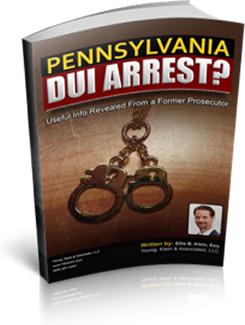District Attorney
Defenses to DUI
A. Probable Cause (Reasonable Suspicion)
In order for a vehicle stop to be constitutional, the police must have “reasonable suspicion” or probable cause for the vehicle stop. Police officers cannot pull over a vehicle for no reason, as courts have held that these stops infringe on the motorist’s constitutional rights. Typically, for a stop to be valid, a police officer must observe a motor vehicle violation or observe criminal activity. Valid reasons for vehicle stops include speeding, careless or reckless driving, substantial drifting outside the lane of travel and other motor vehicle violations observed by the officer.
If the police did not have a valid reason to stop a vehicle, a Motion to Suppress Evidence can be filed in the Court of Common Pleas. At this hearing, which occurs prior to the trial, the police must prove that they had a right to stop the motorist. If the judge rules that the stop was unconstitutional, then all of the evidence of the case is suppressed and the case gets dismissed. Courts have held that stops were unconstitutional in situations where the police observe a “momentary and minor” drifting of a vehicle outside its lane of travel; when police officers did not follow a vehicle for the proper distance while attempt to gauge speed; or if there were other improper reasons for the stop.
Probable cause is not needed when the vehicle is not being pulled over by the police. I have seen many cases where clients have “tried to do the right thing” by pulling over to the side of the road to “sleep it off” when they realized they were too impaired to drive. Unfortunately, Pennsylvania does not have a “sleep it off” policy and these offenders are charged just the same as if they were pulled over for a motor vehicle violation. In situations where the motorist pulls over voluntarily, police need no reason to approach the vehicle and probable cause does not apply.
Probable cause is also not needed when there is an accident. A police officer may approach and question a driver if he believes the driver was involved in an accident. Probable cause is also not needed for DUI Checkpoints, also known as DUI roadblocks. The United States Supreme Court has held that DUI Checkpoints are constitutional, but only if certain guidelines are met such as the checkpoint must be well advertised and in an area known to be frequented by drivers who are under the influence.
B. “The Police didn’t See Me Driving” – Driving, Operating or Actual Physical Control of a Vehicle
The police do not necessarily have to observe a vehicle being driven in order to charge a DUI. he law states that the Commonwealth must prove that a motorist drove, operated, or was in “actual physical control” of the movement of a motor vehicle. Courts have held that if there is no movement of the vehicle observed by the police officer, at a minimum, the vehicle must be running with the defendant behind the wheel. Additionally, there must be other evidence to indicate that the vehicle was driven to that location while the motorist was intoxicated. Factors courts will consider include the location of the vehicle, statements from the driver and any other circumstantial evidence that the vehicle was driven while intoxicated. These situations typically arise when a motorist falls asleep at a traffic light or is found in a disabled vehicle from an accident.
I have successfully defended cases where the motorist fell asleep behind the wheel in a parking lot of an establishment that serves alcoholic beverages. In these cases the Commonwealth was unable to prove that the vehicle was driven to that location while the driver was intoxicated. The driver could have been drinking inside the establishment and simply went to his vehicle to make a call or listen to the radio and fell asleep without having driven the vehicle.
C. Attacking Chemical Testing Procedures
The law states that the police officer, not the motorist, may decide whether to request a chemical test of the motorist’s blood, breath or urine. Typically, blood testing has become the most common as fewer and fewer police departments are relying on the old-fashioned breathalyzer machines. Blood testing is scientifically determined to be more accurate that breath or urine tests, and are about 90 – 95% accurate. From a defense attorney’s standpoint, I would rather see a breath test administered, because breath tests can be up to 20% inaccurate.
The typical defense to blood and urine testing is attacking the “Chain of Custody”. The Commonwealth must prove that the blood was tested at an approved facility and that the blood is indeed this motorist’s blood. The Commonwealth must account for the blood from the moment it is drawn by the nurse to the moment the results are received by the crime lab. Mistakes can be made and therefore, the Commonwealth must prove that the blood test results are from your blood – they must show the Chain of Custody.
For a breath test, the Commonwealth must prove that the breath testing machine is an approved device and that it was tested for accuracy and calibrated within certain time frames. Certificates of accuracy and calibration must be produced in court in order for the results to be valid. Additionally, records must be kept of all results and if there are any deviations greater than .02%, then the machine must be taken out of service and recertified for accuracy and calibrated. If the machine was not immediately taken out of service, then all results after the .02% deviation could be attacked and possibly thrown out of court.










